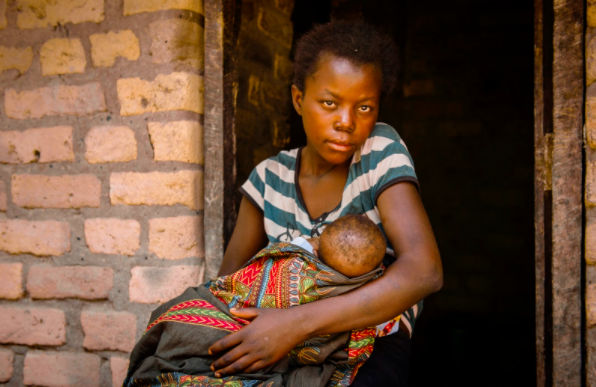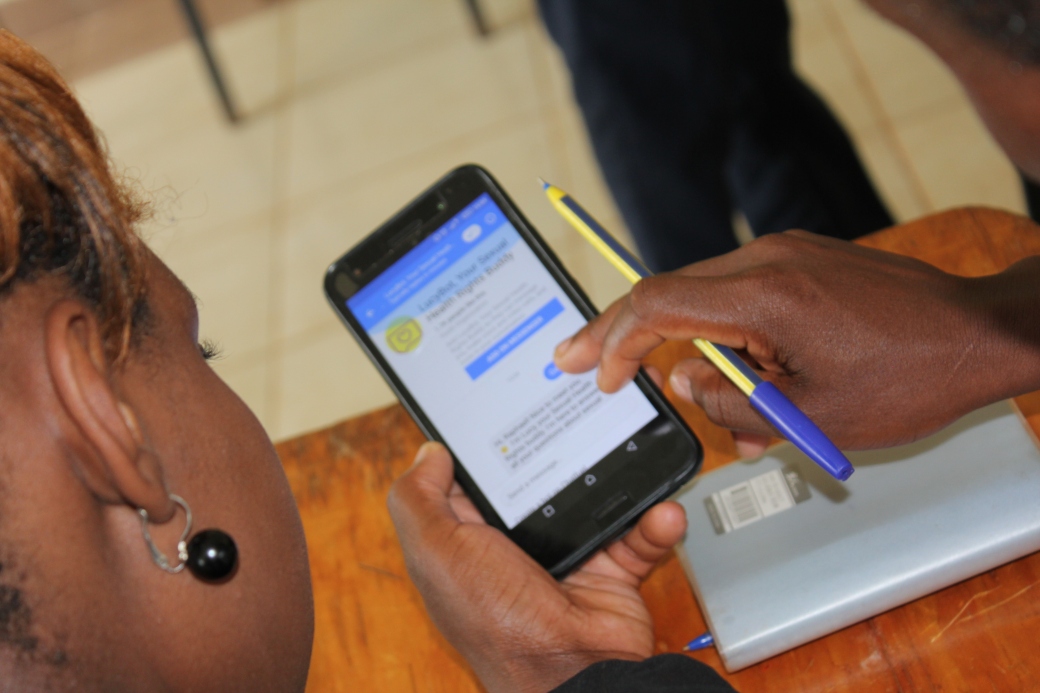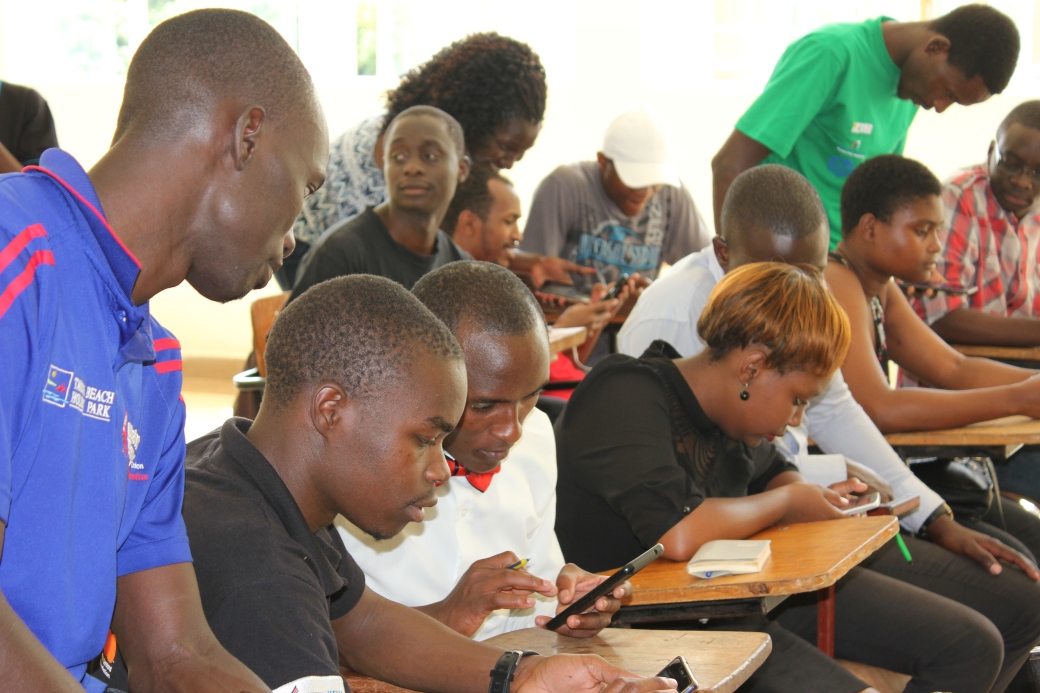BY IMOGEN CALDERWOOD
GLORIA, TWICE WIDOWED BY 17, WAS LEFT ALONE TO GIVE BIRTH.
Child marriage is a problem the world over. Each year, 15 million girls are married before the age of 18. That’s one girl every 2 seconds.
But, while awareness around the problem of child marriage is growing, for many people the question is still how is it happening. How is it that, in the 21st century, girls are still finding themselves being married off at such a young age?
Now, three girls who have themselves experienced child marriage are sharing their stories to try to answer that question.
Doreen, Mary, and Gloria (whose names have been changed to protect their identity), all from rural Zambia, shared their stories with the Campaign for Female Education (Camfed) to give a better understanding of how girls who live in extreme poverty become child brides.
They each hope to protect other girls from having to go through what they have experienced.
GLORIA’S STORY
 With support from Camfed, and the encouragement of the young women alumnae in its CAMA network, Gloria is now returning to school and hopeful that she can achieve her goal of becoming a doctor.
With support from Camfed, and the encouragement of the young women alumnae in its CAMA network, Gloria is now returning to school and hopeful that she can achieve her goal of becoming a doctor.
Gloria’s parents would spend every day on the river, hoping to catch enough fish to sell so that they could afford to send their children to school and buy food for them.
If they didn’t have a lucky day, however, Gloria and her younger brothers and sisters would go to sleep hungry.
When her father died, life got even harder for the family. It was up to Gloria’s mother to provide for herself and her 10 young children.
“I was supposed to be in school at the time I got married,” Gloria, now 17, told Camfed. “I was 12 years old when I got married to a 35 year old man. They said that the man would take care of me, my siblings, and my mother, due to the poverty levels.”
“I cried because I was too young to get married,” she continued. “I didn’t want to, I didn’t understand the meaning of marriage, I was filled with fear.”
But Gloria knew that her mother couldn’t afford to feed her, buy clothes for her, or pay her school fees, and she felt that if she refused to get married, she wouldn’t have anywhere else to go.
However, rather than paying the significant dowry that Gloria’s family had hoped for, that her mother could use to support the family, Gloria’s new husband gave her family a single goat.
In her new role as a wife, Gloria stopped going to school, and instead took care of her husband, and searched for small jobs she could do to earn some money. She and her husband struggled to earn enough to eat. But the greatest loss, for Gloria, was her freedom.
“When I was staying with mum I was free to do what I wanted to do,” she continued. “Now in the house I was taken to, I wasn’t free. I was scared because he refused for me to do anything, and only he decided what should be done.”
As a child bride, Gloria also endured the terror and pain of an unwanted physical relationship. After six months, she discovered she was pregnant.
“When I was pregnant I felt so much pain because I wasn’t ready to conceive at that age,” she said. “I had no knowledge of how to deliver a baby.”
When she was still pregnant, Gloria’s husband died. After the funeral, his brother and successor to his land and property, married Gloria. In her second marriage, she was often subjected to domestic violence, and she lost her baby. Under threat and oppressed, she felt unable to even seek help following her miscarriage.
Years passed, until Gloria eventually became pregnant again. She was still pregnant when her second husband also died and Gloria, still only a child herself, was left alone to give birth.
“If my child could get an education, his life would be different from mine,” she said. “When children are kept in school, they get educated and they reap the benefits. I would like to tell others that when you get married at an early age, things are difficult and you lose all your rights and you suffer a lot.”
DOREEN’S STORY
 Doreen looks forward to returning to school with Camfed’s support and becoming a teacher. She wants to contribute to the development of Zambia.
Doreen looks forward to returning to school with Camfed’s support and becoming a teacher. She wants to contribute to the development of Zambia.
Doreen is the oldest of five children. She was just 7 years old when her mother died and, not long after, her father was killed.
Suddenly orphans, Doreen and her four young siblings had to leave the place where they grew up, and move in with their grandmother in a village nearby.
Her grandmother struggled to look after all the children, until finally she feared they couldn’t survive like that for much longer.
She felt she had no choice but to arrange a marriage for Doreen.
“I was 13 when I got married,” Doreen, now 14, told Camfed. “My husband was 30 years old. It was because of poverty.”
“When I asked [my grandmother] about school, she said the same man who will marry you will take you to school,” she continued. But when I got married, I stopped there and then. I could not continue to go to school because I was supposed to take care of my husband.”
But, as well as having new responsibilities as a wife, Doreen also discovered she was pregnant soon after getting married.
“I was hurt when I discovered I was pregnant. I was too young,” she said. “I used to think that my life would change for the better when I got married, but even the dream that I had that I would take care of my young brothers and sisters turned out to be a myth.”
Her pregnancy was another obstacle between Doreen and her education. Her classmates pointed and laughed at her, and the embarrassment became too much for her. Instead of getting an education, Doreen spent her days sweeping, washing clothes, washing dishes, collecting cassava, collecting firewood, working in neighbouring fields, and cooking for her husband in the evenings.
At 13, far too young to know about childbirth, or how to take care of a baby, Doreen went into a terrifying and painful labour, which resulted in an emergency Caesarean section.
“I’m just a child,” she said. “I’m just the way you see me. And I wouldn’t like anyone who is 14 to go through what I have been through.”
MARY’S STORY
 Mary is now looking forward to getting support from Camfed and its CAMA alumnae (CAMA members) to get the skills she needs to start a business and educate her son.
Mary is now looking forward to getting support from Camfed and its CAMA alumnae (CAMA members) to get the skills she needs to start a business and educate her son.
Mary’s mother and father both passed away in quick succession, leaving Mary and her five younger brothers and sisters to move in with their eldest sibling, in an impoverished fishing community.
She didn’t want to get married because she was so young, but, when a man approached the family seeking to marry Mary, she accepted because her older sibling couldn’t look after all the children.
If Mary were to refuse, she would have been forced to leave home, as her family members were unable to take care of her. With nowhere else to go and no way to support herself, she accepted. She was just 14 years old.
“I hoped life would improve, and that I would help to take care of my young siblings,” Mary, now 15, told Camfed.
But Mary and her husband had no source of income, they struggled to provide for themselves let alone support Mary’s younger siblings. Her husband rarely worked, and she spent her days sweeping, cooking, and cleaning dishes. And when Mary was 5 months pregnant, her husband left and never came back.
Terrified, alone, and preparing to raise a child while still a child herself, Mary didn’t know how she was going to manage. She didn’t know anything about pregnancy or childbirth, all she knew is that she was far too young to be having a baby.
“Even after I had a child he is nowhere to be seen,” she continued. “I was not yet at the age of becoming a mother.”
When the time came, Mary’s sister helped her to deliver a healthy baby. But she was reliant on other people’s help to provide the things she and her baby needed to survive.
“If my mother was still alive, I would have been in school,” Mary added. “She used to tell me to take care of kids who were in school and that next year I will also start school. If I were in school now, my life would have been different. I may have been employed as a teacher.”
All three of these girls, Doreen, Mary, and Gloria, as well as their children, are now being supported by women’s empowerment organisation Camfed so that they can return to school and continue their education.
Doreen is looking forward to being educated just like her friends. Mary is going to undergo training to get the skills and psychological support she needs to start a business, so she can be financially independent. She is looking forward to being able to provide for her son, and to put him through school. She hopes that he might want to become a teacher one day.
Gloria is hopeful that she can achieve her goal of becoming a doctor. There are so few doctors in her district, particularly women doctors, and Gloria wants to be the one to change that. She is determined to send her children to school, so she will never be forced to make the same terrible decisions as her mother.
These girls’ futures are looking brighter. But, said Camfed, “for every girl whose story is told, and whose voice is heard, there are millions waiting for the world to listen.”
Camfed works to help more girls stay in school and out of child marriage, through its Unlock Futures campaign.






